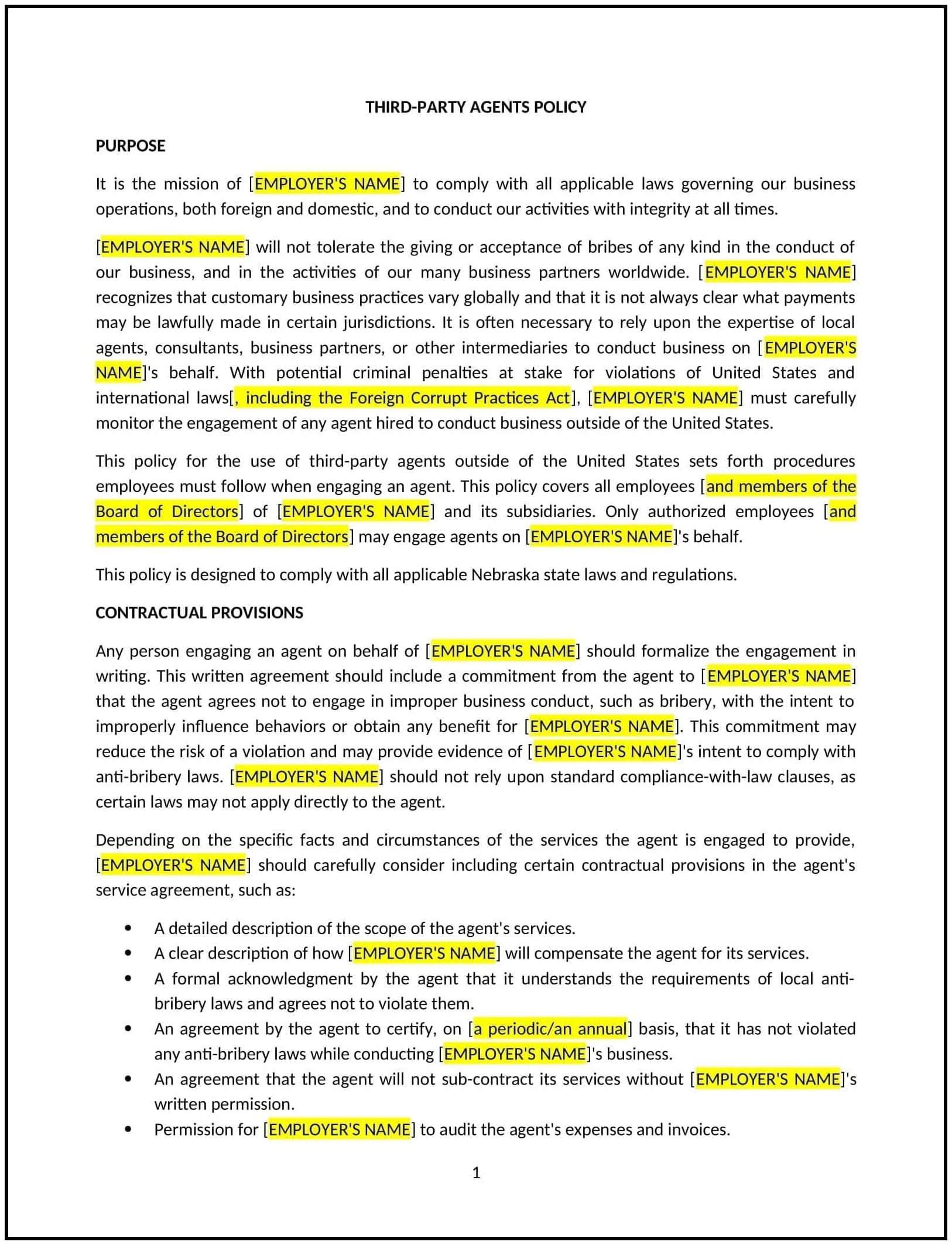Third-party agents policy (Nebraska): Free template
Got contracts to review? While you're here for policies, let Cobrief make contract review effortless—start your free review now.

Customize this template for free
Third-party agents policy (Nebraska)
A third-party agents policy helps Nebraska businesses establish guidelines for engaging and managing third-party agents, such as contractors, vendors, or consultants. This policy is designed to ensure transparency, accountability, and alignment with the business’s values and goals. By formalizing the process for working with third-party agents, businesses can mitigate risks, maintain quality standards, and foster successful partnerships.
By implementing this policy, businesses in Nebraska can streamline third-party relationships, protect their reputation, and ensure consistency in operations.
How to use this third-party agents policy (Nebraska)
- Define third-party agents: Clearly explain who qualifies as a third-party agent, such as contractors, vendors, or consultants.
- Establish selection criteria: Outline the process for selecting third-party agents, including due diligence, qualifications, and alignment with business values.
- Set expectations: Provide guidelines for the conduct, performance, and deliverables expected from third-party agents.
- Address contracts and agreements: Specify the requirements for formal contracts, including scope of work, timelines, payment terms, and confidentiality clauses.
- Monitor performance: Define how third-party agents’ performance will be evaluated, including regular reviews and feedback sessions.
- Ensure compliance: Outline expectations for third-party agents to adhere to applicable laws, regulations, and the business’s policies.
- Communicate the policy: Share the policy with relevant stakeholders, including employees and third-party agents, to ensure awareness and understanding.
- Train employees: Educate staff on how to manage third-party relationships effectively and in accordance with the policy.
- Review and update the policy: Periodically assess the policy’s effectiveness and make adjustments as needed to reflect changes in business needs or legal requirements.
Benefits of using this third-party agents policy (Nebraska)
This policy offers several advantages for Nebraska businesses:
- Promotes transparency: Clear guidelines help ensure that third-party relationships are managed openly and responsibly.
- Reduces risks: Formal processes for selecting and monitoring third-party agents minimize the likelihood of disputes or poor performance.
- Maintains quality standards: Setting expectations and monitoring performance ensures that third-party agents meet the business’s requirements.
- Aligns with Nebraska values: The policy reflects the state’s emphasis on fairness, accountability, and community trust.
- Enhances reputation: Demonstrating a commitment to ethical and professional third-party relationships strengthens the business’s credibility.
- Improves efficiency: Streamlined processes for managing third-party agents save time and resources.
- Supports legal standards: A formal policy helps businesses align with applicable laws and regulations.
Tips for using this third-party agents policy (Nebraska)
- Communicate the policy effectively: Share the policy with employees and third-party agents to ensure clarity and understanding.
- Provide training: Educate employees on how to manage third-party relationships in accordance with the policy.
- Conduct due diligence: Thoroughly vet third-party agents before engaging them to ensure they meet the business’s standards.
- Set clear expectations: Define the scope of work, timelines, and deliverables in contracts to avoid misunderstandings.
- Monitor performance: Regularly review third-party agents’ performance and provide feedback to address any issues promptly.
- Document agreements: Maintain detailed records of contracts, performance reviews, and communications with third-party agents.
- Review the policy periodically: Update the policy as needed to reflect changes in business needs, legal requirements, or industry standards.